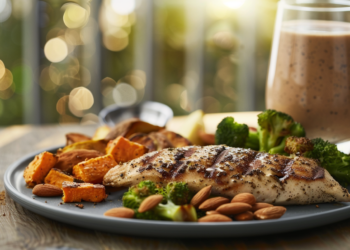Understanding the importance of nutrient timing, we focus on pre/post-workout protein and carb intake for muscle growth. Key macros are protein for repair, carbs for energy, and fats for hormones. Micronutrients like Vitamin C, E, D, Zinc, and Magnesium aid recovery and growth. Balancing meals with quality proteins, carbs, and fats optimizes nutrition. Supplements can enhance performance based on individual needs, but whole foods are a priority. Critical to bodybuilding success is mastering macro-micronutrient balance; it's the cornerstone of muscle growth and recovery.
Key Takeaways
- Balance protein, carbs, and fats for muscle growth and energy.
- Include micronutrients like vitamins C, E, D, zinc, and magnesium for recovery.
- Plan meals with high-quality proteins, carbs, and fats for optimal nutrition.
- Prioritize whole foods over supplements for overall health benefits.
- Consult a nutritionist for personalized advice on bodybuilding nutrition.
Importance of Macro-Micronutrient Balance
Understanding the crucial role of balancing macro and micronutrients is fundamental for optimizing bodybuilding nutrition. Nutrient timing plays a vital role in maximizing muscle growth and recovery. Consuming a combination of proteins and carbohydrates before and after workouts can enhance muscle protein synthesis and glycogen replenishment, respectively.
Pre-workout meals should be rich in carbohydrates for energy, while post-workout nutrition should focus on protein intake to support muscle repair and growth. Hydration strategies are equally important in bodybuilding nutrition. Proper hydration is essential for nutrient transport, temperature regulation, and overall performance. Dehydration can impair workout intensity and recovery, leading to suboptimal results.
To maintain adequate hydration levels, it's recommended to drink water consistently throughout the day and pay attention to fluid intake before, during, and after training sessions. By paying attention to both nutrient timing and hydration strategies, individuals can better support their bodybuilding goals and overall performance.
Essential Macronutrients for Bodybuilding
What are the essential macronutrients that individuals need to prioritize for bodybuilding success? When it comes to bodybuilding, focusing on the right balance of macronutrients is crucial for optimizing muscle growth and recovery. The key macronutrients that play a significant role in bodybuilding are protein, carbohydrates, and fats.
| Macronutrient | Role in Bodybuilding | Food Sources |
|---|---|---|
| Protein | Essential for protein synthesis | Chicken, fish, eggs, tofu |
| Carbohydrates | Provide energy, aid in recovery | Oats, brown rice, sweet potatoes |
| Fats | Important for hormone production | Avocado, nuts, olive oil |
Proteins are the building blocks of muscles and are crucial for protein synthesis, which is essential for muscle repair and growth. Carbohydrates are important for providing energy during workouts and aiding in post-exercise recovery. Timing carbohydrates around workouts can enhance performance and recovery. Healthy fats are also necessary for hormone production, which plays a role in muscle building. Achieving the right balance of these macronutrients is key to supporting your bodybuilding goals effectively.
Key Micronutrients for Muscle Recovery

Key micronutrients crucial for supporting muscle recovery include vitamins such as vitamin C, E, and D, as well as minerals like zinc and magnesium. These micronutrients play essential roles in the body's recovery process post-workout.
Vitamin C is known for its antioxidant properties, which help reduce oxidative stress and inflammation in muscles. Vitamin E aids in repairing muscle cells and protecting them from damage. Additionally, vitamin D is crucial for muscle function and growth. Zinc is involved in protein synthesis and helps regulate immune function, which is vital for recovery. Magnesium is necessary for muscle relaxation and energy production, contributing to overall muscle recovery.
To further enhance muscle recovery, it's essential to focus on adequate protein sources to support muscle repair and growth. Incorporating lean proteins such as chicken, fish, tofu, or beans into meals can help meet protein needs. Hydration strategies are also key, as staying well-hydrated supports nutrient delivery to muscles and helps maintain optimal performance during workouts. Remembering to drink water throughout the day and considering electrolyte-rich beverages for intense training sessions can aid in muscle recovery and overall performance.
Balancing Macros and Micros in Meals
Balancing macronutrients and micronutrients in meals is essential for optimizing overall bodybuilding nutrition and supporting muscle recovery and growth. Meal planning plays a crucial role in achieving this balance. When structuring meals, consider including a source of high-quality protein like lean meats, fish, eggs, or plant-based proteins. These provide amino acids necessary for muscle repair and growth.
Alongside protein, incorporate carbohydrates from sources like whole grains, fruits, and vegetables to replenish glycogen stores and provide energy for workouts. Healthy fats from sources such as nuts, seeds, and avocados support hormone production and joint health.
Nutrient timing is also key. Aim to consume a balanced meal containing all three macronutrients within a few hours of your workout to support muscle recovery. Additionally, spreading out your protein intake evenly throughout the day can optimize muscle protein synthesis.
Supplementing for Optimal Nutrition

When optimizing bodybuilding nutrition, supplementing strategically can enhance overall performance and support muscle growth and recovery. Supplements offer various benefits, such as filling potential nutrient gaps, aiding in muscle repair, and boosting workout performance. It's essential to choose supplements wisely, focusing on those supported by research and tailored to individual needs.
Timing strategies play a crucial role in maximizing supplement effectiveness. For instance, consuming protein supplements like whey or casein around workouts can promote muscle protein synthesis and recovery. Pre-workout supplements containing caffeine and creatine may improve performance during training sessions. Additionally, post-workout carbohydrates and protein can replenish glycogen stores and support muscle recovery.
While supplements can be beneficial, they shouldn't replace a well-rounded diet. It's important to prioritize whole foods to meet macronutrient and micronutrient needs. Consulting with a nutritionist or dietitian can help determine which supplements could be advantageous based on individual goals and dietary habits. By integrating supplements strategically and adhering to proper timing strategies, one can optimize nutrition to better support bodybuilding goals.
Frequently Asked Questions
Can I Still Achieve a Balanced Macro-Micronutrient Intake if I Have Specific Dietary Restrictions or Food Allergies?
Yes, we can still achieve balanced macro-micronutrient intake with specific dietary restrictions or food allergies. Dietary substitutions and allergen alternatives can be incorporated into customized meal plans with guidance from nutrition consultations.
How Does Timing of Meals and Nutrient Intake Throughout the Day Affect Muscle Growth and Recovery?
We've found that proper meal timing and nutrient partitioning can significantly impact muscle growth and recovery. Strategic nutrient intake throughout the day optimizes energy levels and protein synthesis, aiding in muscle repair and development.
Are There Any Specific Macronutrient Ratios or Micronutrient Combinations That Are Best for Maximizing Muscle Gains?
When maximizing muscle gains, focusing on macronutrient distribution is key. Ensuring the right balance of proteins, carbs, and fats fuels muscle growth. Additionally, micronutrient synergy plays a crucial role in supporting muscle development and overall performance.
How Does Hydration Play a Role in Achieving Optimal Macro-Micronutrient Balance for Bodybuilding?
Staying hydrated is key to balance electrolytes and optimize macro-micronutrient absorption for bodybuilding. It's like fueling a high-performance engine; water keeps things running smoothly and ensures nutrients reach muscles efficiently.
What Are Some Common Mistakes People Make When Trying to Balance Their Macros and Micros, and How Can They Be Avoided for Better Results?
When it comes to balancing macros and micros, common pitfalls include neglecting nutrient timing. To avoid these errors, we prioritize meal planning, track intake accurately, and focus on whole foods for optimal results in bodybuilding.
Conclusion
Just like a well-oiled machine requires the perfect balance of gears and oil to function optimally, your body needs the right balance of macros and micros for peak performance.
By prioritizing nutrient-dense foods and supplementing wisely, you can ensure that your bodybuilding journey is fueled for success.
Remember, achieving your goals is like fine-tuning a high-performance engine – it takes patience, precision, and dedication to reach your full potential.













